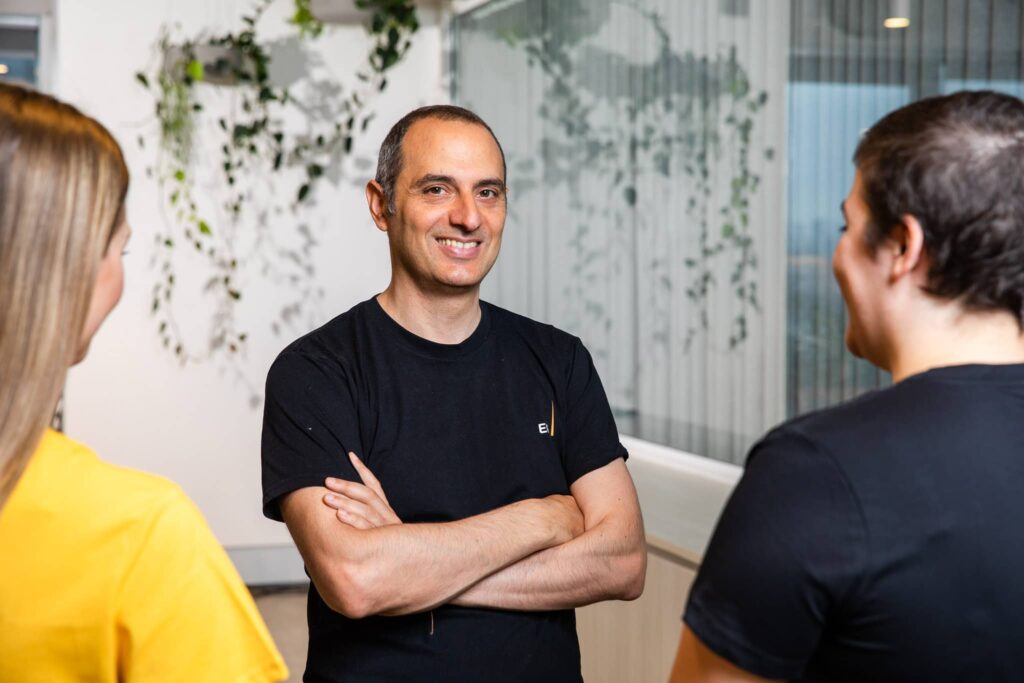Interview originally published in The CEO Magazine, December 2021 issue.
Building in Good by focusing on philanthropy, people, and relationships instead of just numbers, EG CEO Adam Geha is taking the company to the next level.
Words by Anne Majumdar
Jigsaw puzzles have long been a wholesome activity perfectly suited to dreary Sunday afternoons, but for EG Co-Founder and CEO Adam Geha, those carefully shaped pieces mean much more. For him, they are a powerful metaphor for human beings – a unique view of the world that underpins how the real estate fund management company does business.
“Think of the protrusions as your strengths and the indentations as your weaknesses,” Adam explains. “What you want to do is find those people whose strengths fit your weaknesses and whose weaknesses fit your strengths. Then, if you place all those pieces together and do it in a way that is stable and a good fit, you create something that is far greater than the sum of the parts.”
To be a great leader, Adam believes you must be adept at building teams that embrace difference.
“Similar people tend to get on easily, but how do you compile stable teams that incorporate different temperaments and abilities?” he asks. “The answer is to construct them on similar values and visions.”
That’s exactly what he has done with EG over the last 20 years. Since starting off as a two-man band with its first fund in 2002, the company has expanded to close to 100 people going from A$35 million in funds to almost A$2.1 billion over the same period.
The journey has brought with it plenty of exciting challenges and has yielded far more than just profits. “That’s partly why entrepreneurs love business, because on one level it’s a journey of wealth creation, but actually on a much more important and fundamental level, it’s a journey of personal development;” Adam muses. “It pushes you to learn new skills and realise your deficiencies in certain areas.”

Meanwhile, business is booming. EG now has an annual turnover of A$15 million, with Adam aiming to grow that to A$50 million within the next three to five years.
He highlights data as essential to help drive this growth, identifying it as an area that has long been overlooked by the commercial real estate sector, which has traditionally operated simply on “gut feel”. “The next iteration of that will be to continue to use intuition and gut feel but to guide it and feed it with regular data inputs.” As a result, EG has systemised the processes that make up its value chain, introducing data science to every aspect of those functions using risk management software PRISMS® and broader solution FLNT®.
The talent that makes up the EG team will also play a big part in achieving that ambitious goal. As the business scaled up, Adam delegated certain responsibilities, seeking out team members who share his vision and are “hungry, humble and smart”. “If you’re a leader and you’ve chosen the team, then you shouldn’t be managing very much,” he says. “What you should be doing is communicating vision and values. So it’s freedom within boundaries.”
In its efforts to celebrate difference, the company has adopted the unofficial slogan “Keep EG weird”. “I like to say: ‘If you’re not at least a little bit quirky, you haven’t yet found yourself,'” Adam shares. “When I interview people, I always look for people who are a little bit different, because it shows they’ve got the courage to be themselves.”
While many already have “zany, quirky passions”, they are encouraged to take part in EG’s Hobby Program, which gives them two extra weeks of annual leave and covers 70 per cent of the costs if they explore a new interest. Adam himself has a keen personal interest in toy and game invention, which he believes has helped him stretch his lateral thinking skills.
That bigger-picture perspective is also behind EG’s Build In Good (BIG) philosophy, which is central to everything it does. “Rather than funding philanthropy with our profits, we try to build in good to the very thing we do for a living so it becomes integral to the process,” he says. For example, in its residential villages, it promotes a sense of community by supporting events inspired by residents.
“It’s not coming from us; it’s coming from them, and it’s designed to make you feel a sense of belonging to a village, rather than just to a physical building.”
It’s an example of how crucial relationships are to EG. “If you do the right thing by relationships, not only will they feed you in a business sense, but they’ll feed you in a spiritual sense,” Adam reflects. “They’ll actually give you joy, connection and a sense of belonging that no amount of money quite frankly can substitute for.”